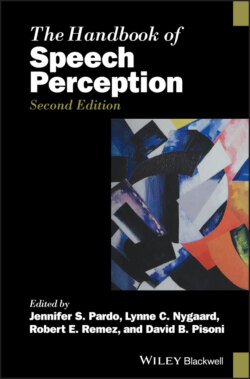Читать книгу The Handbook of Speech Perception - Группа авторов - Страница 52
Semantic representations
ОглавлениеFollowing a long tradition in linguistics that goes back to Saussure (1989), speech may be thought of as a pairing of sound and meaning. In this chapter, our plan has been to follow the so‐called chain of speech (linking articulation, acoustics, and audition) deep into the brain systems involved in comprehending speech (cochlea, subcortical pathways, primary auditory cortex, and beyond). We have asked how the brain represents speech at each stage and even how speech representations are dynamically linked in a network of brain regions, but we have not talked yet about meaning. This was largely dictated by necessity: much more is known about how the brain represents sound than meaning. Indeed, it can even be difficult to pin down what meaning means. In this section, we will focus on a rather narrow kind of meaning, which linguists refer to as semantics and which should be kept distinct from another kind of meaning called pragmatics. Broadly speaking, semantics refers to literal meaning (e.g. ‘It is cold in here’ as a comment on the temperature of the room), whereas pragmatics refers to meaning in context (‘It is cold in here’ as an indirect request that someone close the window). It may be true that much of what is interesting about human communication is contextual (we are social animals after all), but we shall have our hands full trying to come to grips with even a little bit of how the brain represents the literal meaning of words (lexical semantics). Moreover, the presentation we give here views lexical semantics from a relatively new perspective grounded in the recent neuroscience and machine‐learning literatures, rather than in the linguistic (and philosophical) tradition of formal semantics (e.g. Aloni & Dekker, 2016). This is important because many established results in formal semantics have yet to be explained neurobiologically. For future neurobiologists of meaning, there will be many important discoveries to be made.
